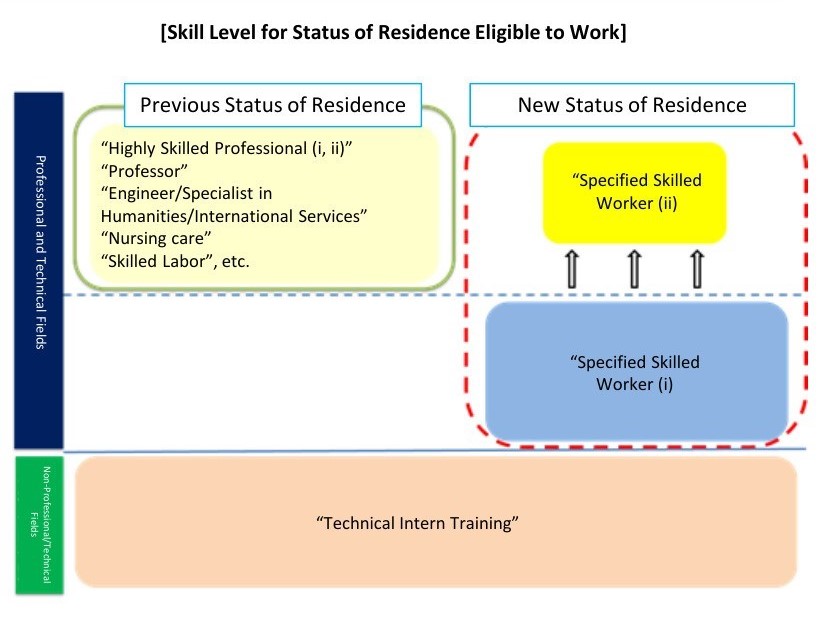Work In Japan: What to Know On Specified Skilled Worker
I’m Kajikawa, an administrative scrivener and the representative director of the Kansai Association of Business Promotion for Muslim.
From April 2019, a new residence status: Specified Skilled Worker, has been introduced.
Despite the COVID-19 pandemic, many foreign nationals and companies are looking to apply for “Specified Skilled Worker”.
It have been increasing opportunities to hire foreign workers in sectors that were previously difficult to do so.
Highly related to the hiring of foreign nationals—What is the “Specified Skilled Worker”?
This article will give you a better idea of what it entails, so be sure to read on.

What is Specified Skilled Worker?
Specified Skilled Worker is a residence or visa status for employment-job purposes.
It is divided into two categories: (i) and (ii). Specified Skilled Worker (i) is for foreign nationals in jobs requiring skills that demand a considerable level of knowledge and experience.
Specified Skilled Worker (ii) is for foreign nationals who undertake jobs requiring advanced skills.
Refer to the figure below for details.

“Efforts for Acceptance of Foreign Nationals and Harmonious Coexistence”
The upper left-box shows the previous residence status, which permits working. It was for foreign nationals with jobs involving professional knowledge-skills, so requiring academic background and work experience.
However, Specified Skilled Worker (i) allows you to work in jobs that DO NOT need the same level of expertise and skills as the previous status.
For Specified Skilled Worker (i), foreign nationals only need to pass a skills exam and proof of Japanese language ability, regardless of their educational background or work experience. (more will explain below)
As for Specified Skilled Worker (ii), you can think of it as a person who has built up a certain level of experience and skills as (i).
As such, Japan can now hire people for a broader range of jobs than ever before.
What Job Can I Do With Specified Skilled Worker?
There are 14 specific industries available with Specified Skilled Worker.
You will not be allowed to work in other industries besides these 14.
The following are the 14 industries:
・Nursing Care Industry
・Building Cleaning Management Industry
・Machine Parts & Tooling Industry
・Industrial Machinery Industry
・Electrical, Electronics and Information Industry
・Construction Industry
・Shipbuilding and Ship Machinery Industry
・Automobile Repair and Maintenance Industry
・Aviation Industry
・Accommodation Industry
・Agriculture Industry
・Fishery (Fishing) & Aquaculture Industry
・Food and Beverage Manufacturing Industry
・Food Service Industry
For companies with multi-business operations, the workplace where the foreign worker (with the Specified Skilled Worker) will work must be in one of the above fields.
Each industry has its own criteria, such as the job scope involved and requirements employers must fulfil.
For example, in construction, the company must have a construction license (even for minor works).
In the nursing care sector, foreign nationals with Specified Skilled Worker can perform physical care work. But they cannot do visiting services (in-home/home-visit).
Things To Be Careful On Specified Skilled Worker
The maximum period for your stay in Japan with Specified Skilled Worker (i) is fixed (5 years).
After 5 years, you have to return to your home country or change to a different residence status.
You also cannot bring your family to live with you in Japan.
Specified Skilled Worker (ii) has no limits to the period of stay.
If you meet the requirements, you may also bring your family (spouse and children) to live in Japan.
As of March 2021, workers in construction and shipbuilding-ship machinery industries can change their residence status to (ii) once they meet the requirements.
Employment status generally is direct-hire on a full-time basis.
Employers cannot hire foreign nationals under a fixed-term (contract employee) or outsourcing contract (subcontractor).
However, dispatched employees are allowed in the agricultural and fishery industries.
As with other residence statuses, both Specified Skilled Worker (i) and (ii) must be renewed.

Things To Expect From Employers
Companies accepting foreign nationals with Specified Skilled Worker will undergo assessments to ensure they are suitable as employers.
For example, the points checked are as follows:
・Comply with all laws-regulations and no violations
・Are there any retirees due to company circumstances
They must have a proper support system when accepting foreign nationals with a Specified Skilled Worker (i). (no need for Specified Skilled Worker (ii))
・Airport pick-up and drop-off upon arrival-departure
・Provide information and support needed for living in Japan
・Regular consultations and support services
・Provide opportunities to learn Japanese
These are some of the things that a support system should include.
If each of the mentioned work sectors has a set standard, it will be checked whether the company comply.
Foreign nationals with Specified Skilled Worker should receive the same treatment as Japanese nationals.
It means that their wages and opportunities for salary increases should be equal to Japanese nationals with similar careers.
Things Expected Of Foreign Nationals
Specified Skilled Worker also has certain conditions that foreign nationals themselves must fulfil.
・Above 18 years old
・In good health
・Passed a skill exam in applicable industries
・Have minimum level of Japanese language proficiency (JLPT N4 or above)
If you have successfully completed Technical Intern Training (ii), you will be exempt from the industrial skills exam.
Your Japanese language proficiency is also recognized if you have completed Technical Intern Training (ii).
There may be other criteria depending on the industry you work, so you have to check with the relevant industry.
Additional Notes
Some countries have a bilateral memorandum of cooperation (MOC) with Japan.
For countries that concluded a bilateral MOC, they have determined approvals and procedures required (sending-out paperwork) in the home country for foreign nationals with Specified Skilled Worker.
If you are from a country with a bilateral MOC, you should follow the procedures and protocols set up in each country.
Conclusion
The establishment of Specified Skilled Worker has increased the number of jobs available to foreign workers.
Today, only 14 industries are open to foreign nationals. But it may increase in the future.
In an era of declining population in Japan, the need for foreign workers might keep growing.
This has been an overview of the Specified Skilled Worker as of March 2021.
As the system may change in the future, please check the latest information and consult a specialist (if needed) when you plan to apply.
 In 2013, I opened my own office as an administrative scrivener in Kyoto. I mainly handle procedures relating to residence status for foreign nationals. In September 2017, I was appointed as the representative director of the Kansai Association of Business Promotion for Muslim. Since 2020, I have been engaged in supporting foreign nationals with Specified Skilled Worker as a Registered Support Organization (English, Arabic, Bengali).
In 2013, I opened my own office as an administrative scrivener in Kyoto. I mainly handle procedures relating to residence status for foreign nationals. In September 2017, I was appointed as the representative director of the Kansai Association of Business Promotion for Muslim. Since 2020, I have been engaged in supporting foreign nationals with Specified Skilled Worker as a Registered Support Organization (English, Arabic, Bengali).≫就労ビザ取得サポート.com (Managed by Kajikawa Administrative Scrivener Office)


